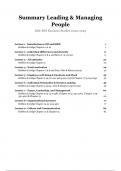Samenvatting
Uitgebreide samenvatting Leading and Managing People
- Instelling
- Universiteit Leiden (UL)
Het vak Leading and Managing People is een elective course binnen de master BPS & Business Studies, ook wel Science Based Business. Het boek Organizational Behavior van Robbins and Judge (18th version) wordt erin behandeld.
[Meer zien]





